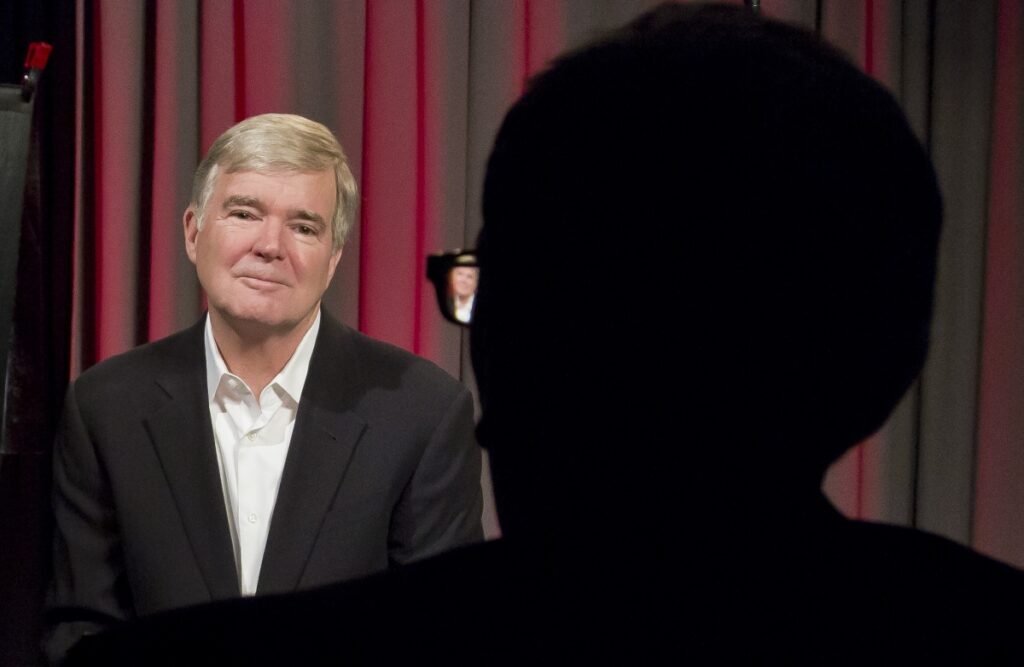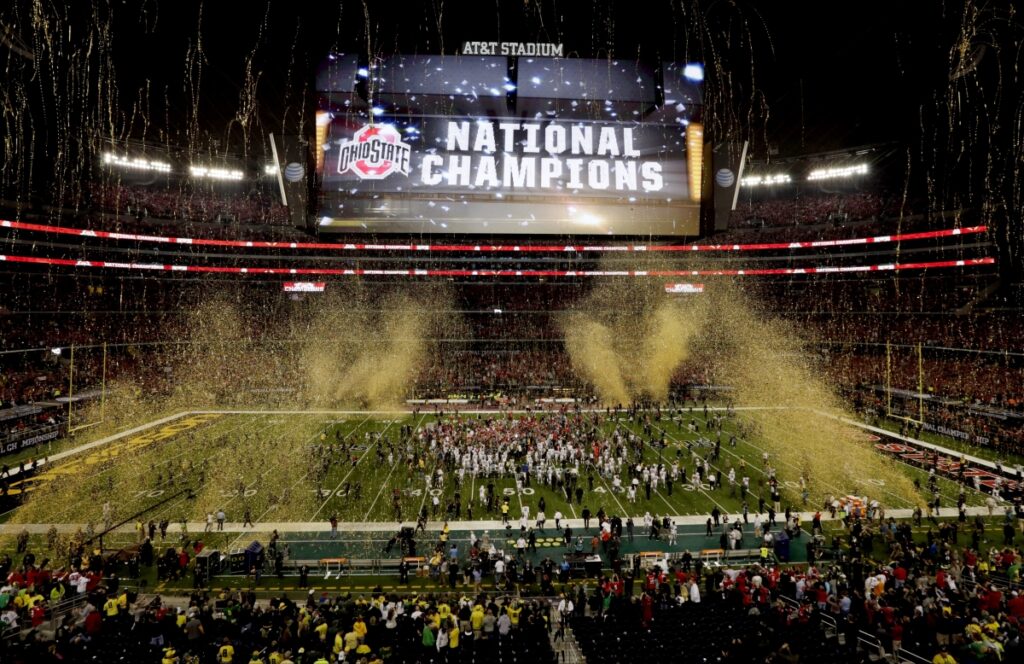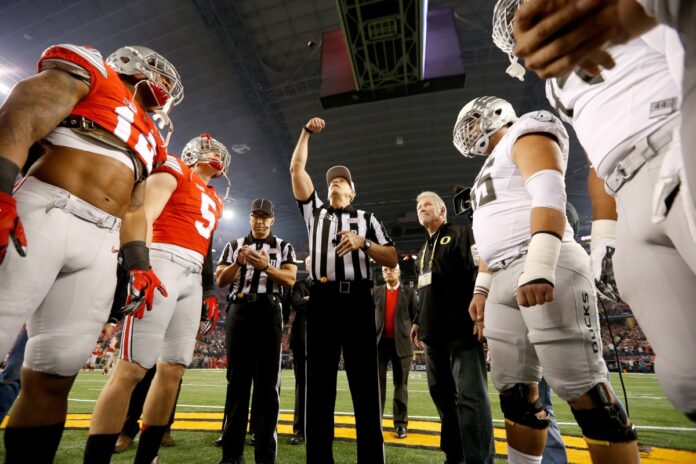Players Get Fleeced as the NCAA, Schools, & Networks Cash In
Television wields substantial economic influence, a fact I deeply appreciate. The financial prosperity I’ve enjoyed can be directly attributed to the extensive airing of the NFL games I participated in. This realization is crystal clear to me.
Now, I am engaged in football media, offering me a profound insight into the industry’s heavy reliance on the athletes on the field.
Our industry’s revenue stream dries up if they aren’t on the pitch. There’s no other way to put it.
As per Nielsen’s data, Ohio State’s impressive 42-20 victory over Oregon notched an impressive 18.5 overnight rating on Monday, marking an extraordinary achievement for ESPN.
This record-breaking achievement isn’t a mere footnote for media insiders; it’s a momentous occasion.
This achievement is particularly significant considering ESPN’s involvement in the highly popular Monday Night Football and the upcoming NFL Wild Card playoff game this January.
What truly boggles the mind is that this rating sets a new milestone for the College Football Championship game, establishing it as the highest-rated program in cable television’s history, as Adweek reported.
This record stands against the backdrop of every special program or movie ever aired on cable, making the compensation of the actors in those other cable programs significantly greater than those involved in this one.
The NCAA’s compensation regulations for players in the national championship game, while presented as a gesture of goodwill, come with clear limitations:
Universities are permitted to provide their players with gifts valued at $400 for the national championship game, with an additional allowance of $415 for the victorious team.
In the case of Ohio State and Oregon players, they were gifted Beats By Dre headphones. However, in compliance with the rules, the value of these headphones is deducted based on their wholesale price, not their retail value.
As a result, each player ultimately takes home approximately $200 after contributing to a performance that generated hundreds of millions of dollars for others.
Despite the numerous arguments against compensating college athletes, it’s essential to remember that these athletes are also American citizens. Many view this compensation structure as a form of highway robbery, given the immense revenue generated through their talents.
This is a business transaction. And the NCAA is the world’s most stingy pimp.
For context, it’s important to recognize that ESPN didn’t secure the rights to broadcast the College Football National Championship game using backpacks or cafeteria credits.
They made a substantial financial investment, paying a significant sum of money, or currency, as you prefer to call it.
ESPN’s annual expenditure of around $500 million to secure the broadcasting rights is a testament to their understanding of the event’s immense value.
It’s crucial to clarify that ESPN has no vested interest in whether college players are receiving fair compensation, nor should they.
Their decision to secure the rights to this game was a savvy business move that has yielded impressive returns.
This was purely a business transaction. On the other hand, the NCAA is often criticized for its stringent financial policies.
The arguments regarding amateurism and education, while often touted as justifications, are seen by many as flimsy rationalizations propagated by those orchestrating the system to placate the individuals who find themselves on the unfavorable end of the arrangement.
Scholarships are notably separate from the playoff scenario. The crux of the matter revolves around providing a service of remarkable expertise and substantial market value and receiving compensation that often feels as insignificant as a bag of damp peanuts.

Let me be perfectly clear: this is not an attempt to diminish the value of a college education.
I, too, was an All-Academic football player at the University of South Dakota, pursuing two majors, and I later earned an MBA at Babson College, a renowned entrepreneurial business program.
I wholeheartedly appreciate the worth of education, and I embrace its significance. However, let’s avoid painting an overly idealized picture.
Your college education holds a tangible value, one determined by the specific price universities charge for their programs. That’s the market value of obtaining an education, and nothing more.
It’s puzzling that as someone eligible to vote or potentially serve in the armed forces, you would also be relegated to a secondary bargaining position as an entertainer in one of the most lucrative sectors of the media industry.
Make no mistake, the national championship game was not broadcast on a public access channel; it was televised on the Entertainment and Sports Programming Network.
While it’s undoubtedly a sporting event, it wasn’t recorded on smartphones; it’s a captivating television production that generates staggering revenue.
Consider the case of a young actor like Macaulay Culkin. He wasn’t compensated for his role in the nearly billion-dollar Home Alone franchise with private school tuition and headphones.
He received a monetary compensation commensurate with his contribution to the production. Without Macaulay Culkin, the producers might have cast another actor, but his work still possessed a negotiated value.
The fundamental principle of compensation in college sports should not differ significantly, except in big-time football, where the players arguably hold even more leverage (though often underutilized) than an actor.
Without these players, neither Ohio State nor Oregon would have been part of this lucrative arrangement. In essence, the players are the very heart of the event.

The concept of determining the total value of college football players is indeed a substantial and intricate topic, one that extends beyond the scope of this column.
However, when it comes to a single, colossal television event that exists independently of campus activities, the matter of player compensation should be straightforward.
It’s a matter of black and white—players should be paid according to their worth in the process, or they can choose not to participate.
When you provide a service, it inherently possesses a value. If a football player hands a cashier $20 for an $8 sandwich, they don’t expect to receive only $0.35 in change due to considerations like amateurism or education; they expect the change they are rightfully owed. It’s as simple as that.
There is a distinct value associated with the services these players provide. I’m not suggesting that the NCAA should graciously offer them a small token of appreciation, as if the players were merely waitstaff deserving of tips.
This mindset is entirely wrong and must be discarded. The players are the focal point of the show, and this should serve as a valuable lesson in understanding their own leverage. They need to exercise this leverage prior to the next season to prevent another unjust act.
Ohio State offensive lineman Darryl Baldwin openly voiced his concerns in an interview before Monday’s game, questioning where the money for the players is:
“Having this playoff is going to make a lot of money,” Baldwin observed, even though he acknowledged the NCAA’s new unlimited food plan as a positive step.
“To put it simply is not getting any. I mean, it’s nothing new, but it’s unbelievable. You would think they would make a change about it, but they haven’t.”
Here’s the crux of the matter, Darryl: Nobody will initiate change unless compelled to do so. You won’t find any executive or administrator willing to forgo their profits and establish your fair valuation out of sheer benevolence.
That’s not how the world of business operates.

Oregon’s defensive end, DeForest Buckner, aptly articulated the sentiments of many players before the game, stating, “We put a lot of time and effort into what we do, and the football program brings in a lot of money to the school.
It’s pretty much our job throughout college. We’re up early; we go to bed late with meetings and practices. Coaches get a big bonus in their checks. It would be cool to get a little piece of the earnings.”
The term “a little piece” indicates the conditioning many athletes have endured, hoping for meager concessions when they possess an abundance of leverage.
In reality, they hold all the cards—they don’t have to play, and without them, the entire business model collapses. This realization should bring everyone to the negotiating table with a clearer perspective.
In response to the compensation debate, NCAA President Mark Emmert argues that “These individuals are not professionals. People come to watch … because it’s college sports, with college athletes.”
It’s perplexing to suggest that people would cease attending games if the athletes were appropriately compensated for their role in generating revenue.
Are we to believe that fans would suddenly abandon the sport if they learned that the athletes received their fair share of the earnings?
It’s a flawed argument, as the only reason these athletes aren’t considered “professionals” is due to the systematic underpayment they endure.
Are tickets to the game free? Are concessions distributed without charge? Did the NCAA and universities settle for hugs in exchange for the lucrative TV rights?
The fact is that these athletes are unpaid, not because they’re unwilling, but because the system exploits them.
Imagine televising Sociology 101 and assessing its revenue potential; the stark contrast would be revealing. It’s time for a fundamental reassessment of the situation, and not just for the athletes.

The ongoing debate over whether college athletes in the nation’s premier programs should be considered professionals misses a wide margin.
This conversation may have been relevant in the past, but we’ve long since moved beyond that point. College football players in the upper echelons of the sport are essentially professionals, albeit grossly underpaid ones.
The athletes in these top programs, who are most affected by the lucrative television playoff developments, must take action.
They need to unite, secure professional representation, compel the NCAA to the negotiation table, and establish and negotiate their rightful monetary worth in the process. This is a matter that should be addressed without delay.
College football players possess the ultimate leverage: they can choose not to participate, effectively ending this highly profitable enterprise.
They must seize this opportunity to ensure their services are no longer the foundation for generating millions of dollars for everyone but themselves.
It’s time for a wake-up call. It’s not admirable to be exploited just because you took a few classes while it was happening.
It’s high time to rectify this imbalance and ensure that college football players receive the recognition and compensation they genuinely deserve.

